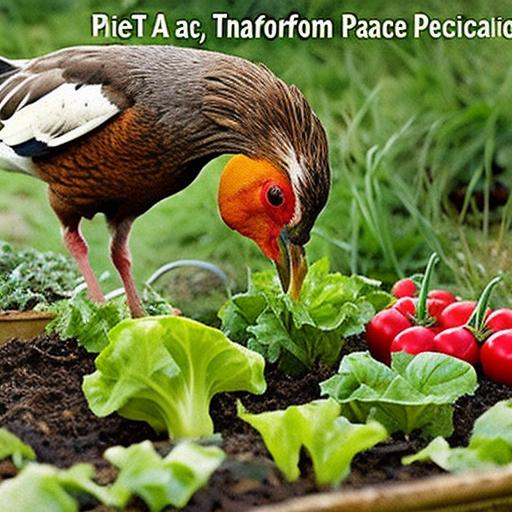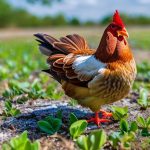Keeping chickens in a vegetable garden is a practice that has gained popularity in recent years. It offers numerous benefits, including pest control, fertilizer production, and the opportunity to have fresh eggs right in your backyard. By integrating chickens into your garden, you can create a sustainable and self-sufficient ecosystem that benefits both the plants and the animals.
Key Takeaways
- Keeping chickens in a vegetable garden can provide numerous benefits, including pest control, fertilizer production, and fresh eggs.
- Before raising chickens in a garden setting, it’s important to understand the basics of their care, including housing, feeding, and health needs.
- Choosing the right breeds of chickens for your vegetable garden can depend on factors such as egg production, temperament, and climate.
- Building a coop and run for your garden chickens requires careful consideration of factors such as size, ventilation, and predator protection.
- Feeding and watering your chickens in a vegetable garden requires providing a balanced diet and clean water, as well as protecting their food from pests.
Benefits of Keeping Chickens in a Vegetable Garden
One of the main benefits of having chickens in a garden setting is pest control. Chickens are natural foragers and will eat insects, slugs, and other pests that can damage your plants. They can help keep your garden free from harmful pests without the need for chemical pesticides.
Another benefit is fertilizer production. Chickens produce manure, which is rich in nutrients that can be used to fertilize your garden. By allowing chickens to roam freely in your garden, their manure will naturally be spread throughout the soil, enriching it and promoting healthy plant growth.
Furthermore, keeping chickens in a vegetable garden provides an opportunity to have a constant supply of fresh eggs. Instead of relying on store-bought eggs, you can enjoy the satisfaction of collecting eggs from your own backyard. Fresh eggs are not only delicious but also more nutritious than store-bought ones.
Understanding the Basics of Raising Chickens in a Garden Setting
Before integrating chickens into your vegetable garden, it’s important to understand the basics of raising them. Chickens have basic needs for food, water, and shelter. They require a balanced diet that includes grains, vegetables, and protein sources such as insects or commercial feed.
In terms of shelter, chickens need a coop that provides protection from predators and extreme weather conditions. The coop should be well-ventilated and have enough space for the chickens to move around comfortably. Additionally, chickens need access to fresh water at all times.
It’s crucial to provide a safe and secure environment for your chickens. This means ensuring that the coop is predator-proof, with sturdy fencing and locks. Regularly inspect the coop for any signs of damage or weakness and make necessary repairs to keep your chickens safe.
Choosing the Right Breeds of Chickens for Your Vegetable Garden
When choosing breeds of chickens for your vegetable garden, it’s important to consider their characteristics and suitability for a garden setting. Some breeds are better suited for free-ranging and foraging, while others are more docile and better suited for confinement.
For a garden setting, it’s generally recommended to choose breeds that are good foragers and have a gentle temperament. Breeds such as Rhode Island Reds, Sussex, and Australorps are known to be good choices for backyard gardens. They are hardy, adaptable, and have a natural inclination to forage.
It’s also worth considering the size of the breed. Smaller breeds may be more suitable if you have limited space in your garden. Bantam breeds, such as Silkies or Polish, are smaller in size and require less space compared to larger breeds.
Building a Coop and Run for Your Garden Chickens
Having a well-designed coop and run is essential for keeping chickens in a garden environment. The coop provides shelter and protection for the chickens, while the run allows them to have access to fresh air and exercise.
When building a coop, it’s important to consider the size and number of chickens you plan to keep. The general rule of thumb is to provide at least 4 square feet of floor space per chicken inside the coop. The coop should also have nesting boxes for the hens to lay their eggs.
The run should be securely fenced to prevent predators from entering and harming the chickens. It should also be covered with wire mesh or netting to protect the chickens from aerial predators such as hawks or owls. Additionally, provide some shade and shelter within the run to protect the chickens from extreme weather conditions.
Feeding and Watering Your Chickens in a Vegetable Garden

Feeding and watering your chickens properly is essential for their health and well-being. Chickens require a balanced diet that includes grains, vegetables, and protein sources. You can supplement their diet with kitchen scraps, garden weeds, or insects they find while foraging.
It’s important to provide fresh water at all times. Chickens need access to clean water for drinking and to help regulate their body temperature. Make sure to clean and refill their water containers regularly to prevent the growth of bacteria.
In a garden setting, it’s important to be mindful of what you feed your chickens. Avoid feeding them toxic plants or plants that have been treated with pesticides or herbicides. Also, be cautious about feeding them too many kitchen scraps that may contain high levels of salt or other harmful substances.
Managing Chicken Manure and Composting in a Garden Setting
Chicken manure is a valuable source of fertilizer for your vegetable garden. It’s rich in nitrogen, phosphorus, and potassium, which are essential nutrients for plant growth. However, it’s important to manage chicken manure properly to prevent any negative impacts on your garden.
To manage chicken manure effectively, it’s recommended to compost it before using it as fertilizer. Composting helps break down the manure and reduces the risk of pathogens or odors. You can create a compost pile specifically for chicken manure or incorporate it into an existing compost system.
When using chicken manure as fertilizer, it’s important to apply it in moderation. Too much nitrogen from the manure can burn plants or cause excessive leafy growth at the expense of fruit production. It’s best to mix the composted manure with other organic matter, such as compost or straw, to create a balanced and nutrient-rich soil amendment.
Protecting Your Garden from Chicken Damage
While chickens can be beneficial to a vegetable garden, they can also cause damage if not properly managed. They have a natural instinct to scratch and dig, which can uproot plants or expose their roots. They may also eat young seedlings or peck at ripe fruits and vegetables.
To protect your garden from chicken damage, it’s important to provide them with enough space to forage and explore without causing harm. Consider using temporary fencing or netting to create designated areas where chickens can roam freely without accessing sensitive areas of the garden.
You can also use physical barriers, such as chicken wire or low fences, to protect specific plants or areas of the garden. For example, you can create raised beds or use cloches to protect young seedlings or delicate plants from being damaged by the chickens.
Integrating Chickens with Other Garden Animals and Plants
Integrating chickens with other garden animals and plants can create a harmonious and self-sustaining ecosystem. Chickens can help control pests that may harm other animals or plants in the garden. For example, they can eat snails or slugs that may damage your vegetable crops.
Chickens can also benefit from the presence of other animals in the garden. For example, ducks or geese can help control pests in the garden while providing companionship for the chickens. Be mindful of the compatibility of different animals and ensure that they have enough space and resources to coexist peacefully.
In terms of plants, chickens can help with weed control by eating weeds or scratching the soil to expose weed seeds. However, be cautious about allowing chickens to forage among your vegetable crops, as they may damage or eat them. Consider using fencing or netting to separate the chickens from sensitive areas of the garden.
Legal Considerations for Keeping Chickens in a Vegetable Garden
Before keeping chickens in a vegetable garden, it’s important to be aware of any legal considerations or restrictions in your area. Some cities or neighborhoods may have specific regulations regarding the keeping of chickens, such as limits on the number of chickens allowed or requirements for coop design.
Research the local laws and regulations to ensure that you are in compliance. If there are restrictions, consider reaching out to local authorities or community organizations to advocate for changes that would allow for the keeping of chickens in a garden setting.
Common Challenges and Solutions for Keeping Chickens in a Garden Environment
Keeping chickens in a garden environment can come with its own set of challenges. Some common challenges include predator attacks, disease outbreaks, or conflicts with neighbors. However, there are solutions to these challenges that can help ensure a successful and harmonious integration of chickens into your garden.
To protect your chickens from predators, make sure to provide a secure coop and run that is predator-proof. Use sturdy fencing and locks to prevent access from predators such as raccoons or foxes. Consider using motion-activated lights or alarms to deter nocturnal predators.
To prevent disease outbreaks, practice good biosecurity measures. Keep the coop clean and dry, and regularly disinfect feeders and water containers. Quarantine new chickens before introducing them to the existing flock to prevent the spread of diseases.
To address conflicts with neighbors, communicate openly and honestly about your intentions and plans for keeping chickens in your garden. Address any concerns they may have and be willing to make adjustments if necessary. Offer to share fresh eggs or invite them to visit your garden to see the benefits firsthand.
Keeping chickens in a vegetable garden offers numerous benefits, including pest control, fertilizer production, and the opportunity to have fresh eggs right in your backyard. By understanding the basics of raising chickens, choosing the right breeds, providing a suitable coop and run, and managing their food and water needs, you can successfully integrate chickens into your garden environment.
While there may be challenges and legal considerations to navigate, the rewards of keeping chickens in a vegetable garden are well worth it. Not only will you have a sustainable and self-sufficient ecosystem, but you will also enjoy the satisfaction of knowing exactly where your food comes from. Consider adding chickens to your garden and experience the joys of this rewarding and fulfilling endeavor.
If you’re wondering whether you can keep chickens in your vegetable garden, you’ll definitely want to check out this informative article on Poultry Wizard. They provide valuable insights and tips on how to create a garden chicken coop that allows your feathered friends to roam freely while protecting your precious crops. Discover the benefits of integrating chickens into your vegetable garden and learn how to design a coop that is both functional and aesthetically pleasing. To find out more, click here: https://poultrywizard.com/keeping-chickens/garden-chicken-coop/.
FAQs
What are the benefits of keeping chickens in a vegetable garden?
Keeping chickens in a vegetable garden can provide several benefits such as natural pest control, fertilization of the soil, and a source of fresh eggs.
What are the potential drawbacks of keeping chickens in a vegetable garden?
The potential drawbacks of keeping chickens in a vegetable garden include damage to plants, soil compaction, and the need for proper waste management to prevent odors and pests.
What kind of space do chickens need in a vegetable garden?
Chickens need at least 4 square feet of space per bird in a coop and 10 square feet of outdoor space per bird. The coop should be elevated and have a solid floor to prevent predators from digging in.
What kind of fencing is needed to keep chickens in a vegetable garden?
A sturdy fence that is at least 6 feet tall and buried at least 6 inches deep is needed to keep chickens in a vegetable garden. The fence should also have a top to prevent predators from climbing over.
What kind of food do chickens need in a vegetable garden?
Chickens need a balanced diet of grains, protein, and calcium. They can eat vegetable scraps and weeds from the garden, but their diet should also include commercial feed and supplements.
How do you manage chicken waste in a vegetable garden?
Chicken waste should be collected regularly and composted before being used as fertilizer in the garden. It should not be used fresh as it can burn plants and attract pests. Proper waste management is important to prevent odors and pests.
Meet Walter, the feathered-friend fanatic of Florida! Nestled in the sunshine state, Walter struts through life with his feathered companions, clucking his way to happiness. With a coop that’s fancier than a five-star hotel, he’s the Don Juan of the chicken world. When he’s not teaching his hens to do the cha-cha, you’ll find him in a heated debate with his prized rooster, Sir Clucks-a-Lot. Walter’s poultry passion is no yolk; he’s the sunny-side-up guy you never knew you needed in your flock of friends!







